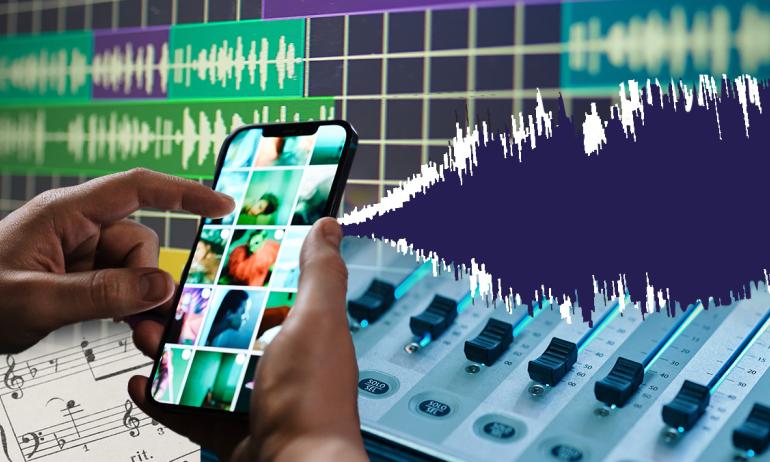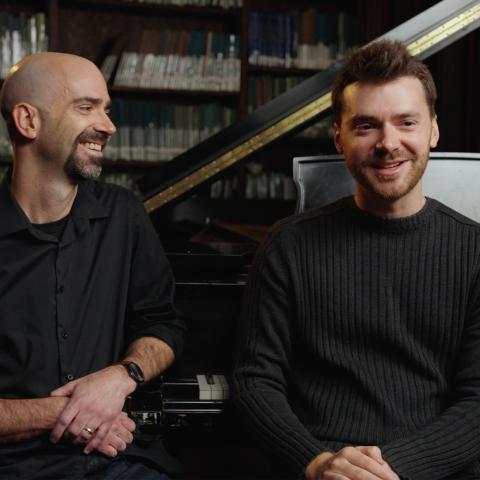New Law Could Help Cash Flow to Artists
When Shelly Peiken started her career in music, the road to making a living as a songwriter was clear. If you had a few album cuts, “you were fine,” she says. Fans would buy an album, and all the tracks’ songwriters earned royalties. You didn’t even need a radio hit—though Peiken had them. She cowrote two major ones: “Bitch” with Meredith Brooks and “What a Girl Wants” for Christina Aguilera.
Then came the digital revolution. Streaming replaced sales—and the money evaporated. “We had a very healthy royalty stream, pre-digital, from physical sales,” Peiken says. “That income stream completely dried up.”
Songwriters weren’t the only ones who saw their bank balances shrivel: Royalty rates for digital streaming were tiny. These new, digital music companies didn’t always track down the owners they were supposed to pay. Further, recordings released before 1972 didn’t generate royalty rights, and engineers, mixers, and producers didn’t receive any royalties.
Peiken doesn’t want to turn back the clock. “We’re all streaming fools,” she says. “We love it. We want it.” But she also doesn’t want her peers to have to moonlight as Uber drivers. Now, for the first time, she’s optimistic—because the Music Modernization Act of 2018 (MMA) represents the biggest change to U.S. music copyright law in a generation.
First, a quick music business/management refresher. Every recording has two copyrights. One is attached to that particular recording—say, Whitney Houston’s “I Will Always Love You” as released on The Bodyguard soundtrack. The other is applied to the composition and its creator—in this case, Dolly Parton. That composition royalty divides, in turn, into three specific rights: to perform, to reproduce, and to distribute the song—for example, to cover the song as Houston did. Distribution and reproduction are jointly called “mechanical” royalties. Entities pay copyright owners to use a particular piece of music for a particular purpose.
This structure was created in the era of the player piano, says lawyer Meredith Rose of Public Knowledge, and it translated only imperfectly into the digital world. A 2015 report from the U.S. Copyright Office put it this way: “We are trying to deliver bits and bytes through a Victrola.”
Even after Congress updated copyright laws during the late 1990s to reflect the digital era, there were gaps, which the Music Modernization Act has now patched. The new law promises to help songwriters and composers recoup the money they lost in the transition from sales to streaming, including some money they should have been paid all along. It expands royalty rights for producers. And it extends new protections to artists who released recordings before 1972.
Here’s what you need to know.
Four Big Impacts on Musicians
1. It will be easier for songwriters to get paid.
Although digital music streaming services are supposed to pay royalties, getting that money to songwriters has been hit or miss. Before the Music Modernization Act, mechanical royalties in particular often fell through the cracks; to license those uses, companies generally had to contact songwriters and music publishers directly, song by song. Berklee songwriting faculty member Melissa Ferrick is among the artists who sued Spotify for copyright infringement, claiming the company made no real effort to legally license her music. (Spotify has settled the suit, and Ferrick said she could not discuss the matter.)
The MMA addresses that problem by creating a new central clearinghouse for digital mechanical royalties called the Mechanical Licensing Collective (MLC). Rather than hunting down individual songwriters, streaming services may license works via the collective. It will then be the collective’s task to funnel payment to the rightful recipients, leaving the digital music companies protected against lawsuits.
It may sound like a small piece of the royalty pie, but it’s a slice that’s only going to grow as streaming music continues to overtake buying. “Ultimately, the majority of your future payments are going to go through this clearinghouse,” says Panos Panay, Berklee’s vice president for innovation and strategy. In addition, ending a debate, the new law makes it clear that digital streaming services have to pay mechanical royalties even though streaming a song doesn’t resemble the reproduction and distribution of the old days.
2. New dollars are coming to some musicians.
“Legacy” artists and their estates will now get paid for digital streaming. This change is thanks to a different part of the Music Modernization Act that solved another problem, which was the loophole in federal protections for sound recordings released before 1972. Digital services haven’t had to pay to play those older tracks, making it comparatively inexpensive for, say, Sirius XM to offer its “’50s on 5” channel. Now, these services have to pay to play all music, regardless of when it was released. At the same time, the new law also makes it simpler to release noncommercial recordings of these older tracks if they are not currently commercially available and no rights-owner objects to a public notice within 90 days. The law also sets definitive time frames for when each recording will enter the public domain. That’s an important step for libraries and archives that are racing to digitize fragile wax cylinders and brittle 78s before they disintegrate, Rose notes.
The new law also extends sound-recording royalties to music producers, engineers, and mixers. It’s limited to certain circumstances and uses, and an official payee for a recording generally has to agree to the payout, because the producer’s share actually comes out of theirs (there are exceptions for tracks that predate the digital era). However, along with opening a new income stream, the law sets a precedent for compensating these technical artists who, until now, were invisible under federal copyright law.
3. Royalty rates might increase.
Even when musicians have been paid digital streaming royalties, the rates have been miniscule. “It’s not even pennies on the dollar. It’s like fractions of pennies on the dollar,” says songwriter Michelle Lewis, Peiken’s partner in the advocacy group Songwriters of North America, which was involved in getting the MMA passed. The take-home is especially low for “noninteractive” services, such as Pandora, that pick the songs for the listener, and for free services. Indie cellist/composer Zoë Keating, formerly of the band Rasputina, tweeted in December that she pocketed just over $12,000 from 2.3 million Spotify streams—not enough to cover even half her rent last year. Her Pandora rates were worse yet: $2,818 for 1.5 million listens.
The Music Modernization Act changes the way some of these rates get set. It does this by changing how federal judges set royalty rates when negotiations break down. For example, judges are now allowed to factor in the rates for other kinds of royalties, and they can consider the value in maximizing the availability of the work—not just its fair-market value. No one knows whether royalty rates will change, and if they do, in which direction. “Everyone thinks [content creators] are going to be either getting more money—or paying less,” Rose says. Still, Lewis and Peiken are hopeful that artists will benefit.
4. Technology could open new doors.
Implementing the MMA will take a heavy technology lift. In order to match payments to rights-holders, the Mechanical Licensing Collective has to maintain an enormous database of compositions. The Berklee-led Open Music Initiative thinks that database could pave the way to interconnected, open data about music across the industry.
Typically, music companies store information in their own proprietary databases. Those closed systems foster inconsistency and inaccuracy, Panay says. Berklee’s Institute of Creative Entrepreneurship, which he directs, estimated in a 2015 report that 20 percent to 50 percent of royalty payments don’t reach their rightful owners. This decentralized system also means that “getting any accurate reporting as an artist is a complete mess,” Panay says.
That’s why the Open Music Initiative, which is composed of about 250 organizations, including some streaming services, is advocating that the new MLC database be built according to open standards. Panay envisions a system where “you don’t have to go to 30 places to do the same thing,” he notes, and “any change that happens is reflected across the whole ecosystem.” For instance, you could record a song in Pro Tools and be digitally identified as the writer everywhere you uploaded that song. Open standards would also let programmers build apps from this data—like a program that tracked what your song was doing on various services and how much money you should be making.
“Where you have open standards, you can enable innovation,” Panay says. If the Mechanical Licensing Collective instead falls back on an old, closed database model, “we’re not going to fulfill the promise of the [MMA].”
What Do You Need To Do?
It will take a couple of years to fully implement the MMA. But advocates agree that it’s important for musicians to keep an eye out for developments.
The most important task: Make sure you’re on the lists. Songwriters and composers won’t get paid through the Mechanical Licensing Collective if they’re not recorded in that big database, and it might require action on your part: Music publishers will register works they represent, but “if you’re self-published, then you have to sign up on your own,” Lewis says. The clock is ticking. If the MLC can’t find the copyright-holder within three years, it will redistribute that person’s royalties to others. If you sign up late, you’ll get only the past three years of royalties, not revenue your song earned prior to that. In fact, it’s possible that the collective will have only one year to find the rightful recipients for the large sum of royalties that have already piled up; that question is being debated right now.
Similarly, the Copyright Office is creating a list of the pre-1972 recording rights-holders who are due digital royalties. Even though record labels will submit their catalogs, “a lot of these labels do not know what they own,” Rose says. If you’re a legacy artist or the heir to one, contact your label ASAP to make sure its information is accurate.
Also, songwriters and composers should “keep a close watch on this new entity that’s coming up—the MLC,” entertainment lawyer Matthew Stearns B.M. ’08 says. It’s not a given that there will be transparency about how the money goes in and out, and some fear that it will be “basically a black box,” he says. The U.S. Copyright Office is choosing who will run the collective this spring, and anyone can submit their comments at copyright.gov.
Finally, though legal issues aren’t every musician’s favorite topic, it’s important to “understand your fundamental rights,” Stearns emphasizes. “Participate in discussions regarding copyright and how to understand music agreements.” He recommends seeing which educational opportunities are available through Berklee’s alumni programs and events.
Because it’s your money, your precious work, and your career. The Music Modernization Act is “not going to change the world overnight—nothing ever does,” Peiken says. “But it’s a giant step in the right direction.”




